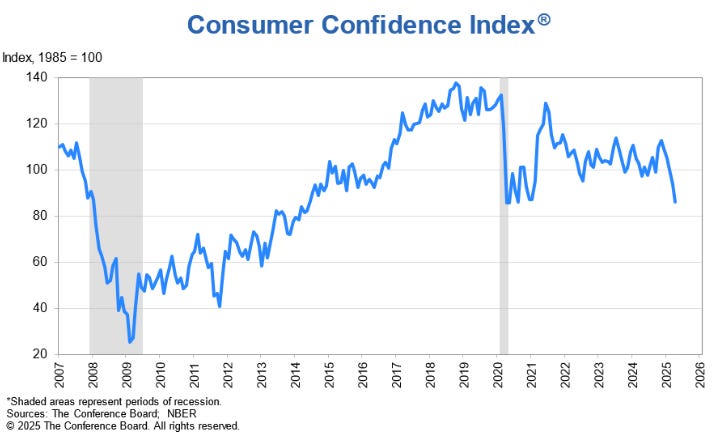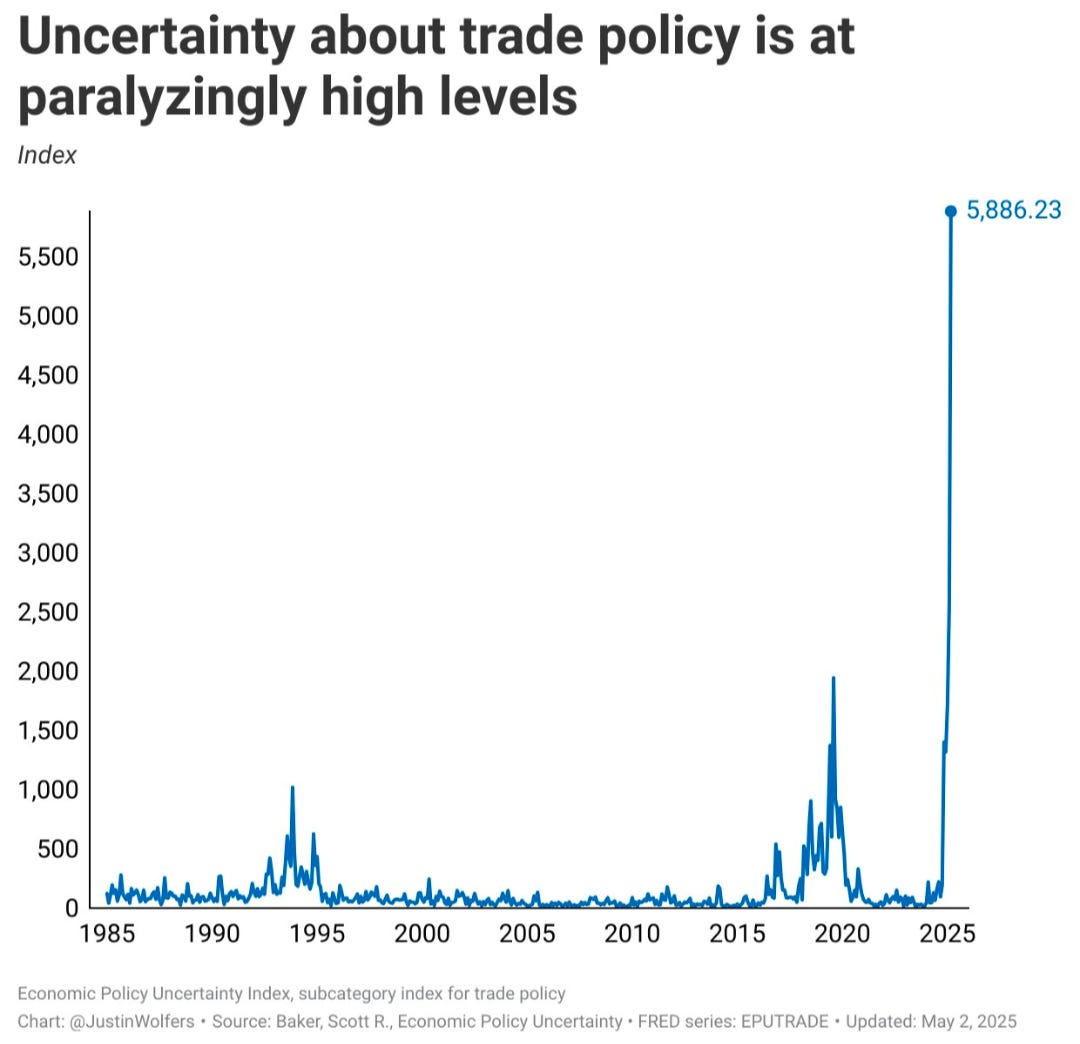Trump has announced another non-deal in his ongoing trade wars: a 90-day “pause” with China that reduces Trump’s tariffs from 145% to 30% and China’s retaliatory tariffs from 125% to 10%. America gained nothing, just like it gained nothing with the framework of a potential deal with the UK, which represents only 3% of US trade, and with whom we already have a trade surplus.
In both cases, tariffs are still higher than before Trump took office, meaning prices will be higher. We’re far from the “90 deals in 90 days” the administration assured us would happen.
America is a consumerist nation. Seventy percent of our gross domestic product comes from consumer spending, which amounts to over $19 trillion yearly, more than any other country’s entire GDP, even China.
Another way of thinking about this is that our economy is strongest when capital is fluid. The more money that flows from businesses to people back to businesses, the stronger our growth and prosperity.
Understanding what keeps people spending and what makes them stop is essential for enacting the best economic policies for America. Scarcity and quickly rising prices are bad for spending; uncertainty is worse.
Uncertainty is economic kryptonite. When businesses aren’t sure of the future, they don’t invest or hire. They save, cut back, and wait. Ford, Mattel, UPS, Delta, American Airlines, Southwest Airlines, Alaska Air, and Stellantis have all pulled or suspended their future earnings guidance. General Motors, Clorox, and Marriott have revised and lowered their guidance.
Add economic challenges and a slowdown to the uncertainty, and you have a recipe for layoffs. The retail sector lost 64,000 jobs so far this year, an almost 300% increase from this same time last year. Tech has lost 150,000, partly because big names like Microsoft, Meta, Amazon, and Google are transitioning to a focus on AI, causing a displacement of workers, which we will touch back on later. General Motors, Ford, and Stellantis have all announced layoffs. UPS said 20,000 jobs would be cut due to the trade wars affecting the shipping industry. There are also government layoffs, which have been structured not to hit the jobs report in the same month.
When consumers aren’t sure what prices, jobs, and the overall economy will be like in the near future, they hunker down and cut back. According to a survey by The Conference Board, which releases a monthly Consumer Confidence Index, 32% of consumers expect there to be fewer jobs in six months. April’s index was the second consecutive significant drop, returning confidence levels to the lows seen during the pandemic.
The Expectations Index, which measures consumers' feelings about the near-term future of jobs and the economy, dropped to 54.4. Eighty and below is the threshold that signals a recession may be heading our way.
If GDP growth is negative, or shrinking, for two quarters in a row, then we are in a recession. Last quarter, the GDP shrank by 0.3%, and tariffs had only partially been implemented, with their effects not yet felt. Consumers are right to be concerned.
Tariffs are leading to a slowdown in job growth, increased layoffs, increased prices, massive uncertainty, and hoarding—all things that get in the way of people spending. Broad tariffs were a terrible idea from the start. We’re far from pretending they’d make us rich, just like talk of DOGE checks faded from memory. The current reasoning is that tariffs are being used to fix trade deficits. However, trade deficits are neither inherently good nor bad, and Trump increased tariffs on the UK, when we already have a trade surplus with them.
America generates 26% of the world’s GDP while having 4% of the world’s population. Americans spend that money, which is why 70% of our GDP comes from consumerism. We need to import products, making some trade deficits inevitable.
America has only increased its prosperity with free trade deals. Our unemployment rate remains low. We don’t need massive assembly plants. Building them would take years, uncertainty prevents any company from making that investment, and American labor would be too cost-prohibitive. So, they would be automated facilities, creating few jobs.
The extreme levels of uncertainty are caused by Trump and Trump alone. His policies change by the day. He enacts tariffs, pauses tariffs, enacts higher ones, claims we never need China again, and then cuts back the tariffs to lower the cost of Chinese products. There is no expert knowledge, no research, and no long-term goal. It is whatever Trump feels like in that moment, which means no one can do business with or in the United States because it is impossible to plan investments.
In a country as wealthy as America, the focus needs to be on investing in high-tech industries, finance, and future technology. That’s where the money will be, and we have the resources to become leaders in whatever sector we want to. But we also need the workforce to fill those jobs.
Millions of Americans feel left behind. They worked in the coal industry, manufacturing, and new technology, such as AI, is taking over coding and other tech jobs. It is in everyone’s best interest to have federally backed job training programs that make it affordable and straightforward for someone in an outdated profession to learn the skills to get in the door in up-and-coming careers. Instead of denigrating and attacking remote workers, politicians should be embracing remote work as a way to help communities built around industries that have fallen behind to reinvigorate themselves through quality, good-paying remote jobs.
Trump must end his broad tariffs and commit to free trade agreements. We need to invest in America's industry and future technologies. The federal minimum wage must be increased to give working-class Americans more to spend. And America needs to wake up and see the global economy for what it is. Either we participate in it as an economic leader, increasing our wealth, influence, and power, or we isolate ourselves and fall behind while the world moves on without us.
End the uncertainty to increase prosperity.
https://www.thestreet.com/retail/one-of-the-biggest-workforces-in-the-us-is-facing-mass-layoffs
https://www.forbes.com/sites/jackkelly/2025/05/10/big-layoffs-are-hitting-these-sectors-the-hardest/
https://www.conference-board.org/topics/consumer-confidence
Redirect Your Anger
Americans are frustrated at the difficulty of making ends meet. Campaign promises about tackling inflation, lowering prices, mass deporting migrants, and using tariffs to solve our problems likely won one of the closest presidential elections in US history.







While I agree with everything that is written, it still comes back to a nagging question: What will job-age Americans do for work? Yes, some will survive in the high tech center, but AI will put many out of work. No more need for clerks, support staff. People can go into health care professions; that is still available. But the majority will be pushed into working at the warehouse stores, which will never pay enough to match the rising cost of housing plus consumer goods. And even that will be affected by AI. We will eventually have our "king" (Trump and his successors), the nobility (billionaires), a professional class and serfs. Techno feudal society is on its way, even without Trump.